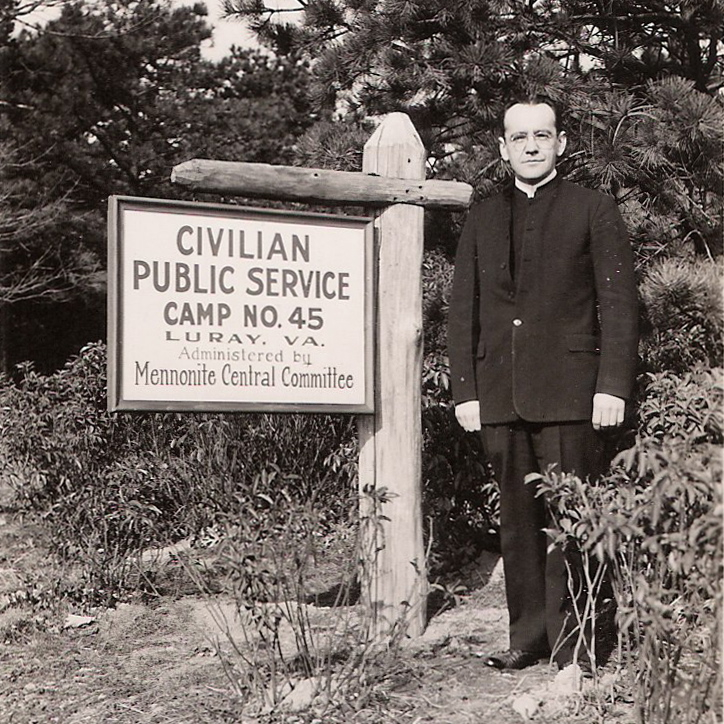
As the United States entered World War II, the Brethren in Christ Church drew increasingly closer to its “peace church” allies, the Mennonites and the Quakers (Society of Friends). In partnership with the Mennonites, the Brethren in Christ established programs to meet the problems caused by the war. In the U.S., Civilian Public Service (CPS) camps provided conscientious objectors (COs) with an alternative to war duty. (A similar program, called Alternative Service Work, was established for Canadians unwilling to provide war service.)
Life in the CPS camps was tough for some of these COs. Separated from family and friends, often ridiculed or mocked by those who did not understand their unwillingness to serve in the military, these young people often felt alone, misunderstood, or confused. Almost immediately, both the Mennonites and the Brethren in Christ dispatched church leaders to work with and tend to the spiritual needs of these COs.
C.N. Hostetter, Jr. — Brethren in Christ bishop, Messiah College president, and Mennonite Central Committee leader — visited numerous CPS camps across the United States during World War II. He visited with the COs, provided spiritual counsel, and taught courses on the Bible and Christian nonresistance. As biographer E. Morris Sider highlights in his book Messenger of Grace, these visits were well-received — both by the COs themselves and by those given oversight of the camps. As one camp director later recalled:
[Hostetter] could sooth the CPS fellows. These boys at that time thought they were going through a period of awfully bad luck. Some visitors would come to the camp and be shocked when they didn’t find everything and everybody perfect. But C.N. was not shocked when he found conditions less than ideal; he was immediately sympathetic, and the fellows could sense his sympathy.
One of those “CPS fellows” would also recall Hostetter’s warmth and generosity of spirit:
He sensed where I was. He didn’t confront me as others had with the questions of how I was getting along in my spiritual life. We found a room and he told me bedbug stories! . . . We ate in a restaurant, then went to a hotel in the afternoon before they turned on the heat [at the camp]. He told me stories about Bob Worman, and read me a couple of chapters from the Screwtape Letters. We went to church at night. . . .
I just shook my head and said, “I can’t believe it.” He just so completely gave himself to me. He never once did that which people are wont to do.
Then when he got home he wrote my mother a letter which said something like this: “I visited [your son]. He is getting along fine.” . . . That was the master stroke of a wise man.
To read more about Hostetter, his work among conscientious objectors, and his views on nonresistance, see E. Morris Sider, Messenger of Grace: A Biography of C.N. Hostetter, Jr. (Nappanee, Ind: Evangel Press, 1982). The above selections come from pages 161-162 of that text.

What a lovely tribute to a caring man. He seems to have had a very special ability to communicate with young men.
I did some research on the CPS camps when I was working on the article on “Sea-Going Cowboys.”
It is fascinating to me how many BinC men eschewed military service yet took part in such critical efforts as the CPS work.
Then after the war, when the call went out to take farm animals to war-torn Europe, it was again the men of the traditional peace churches who responded, in numbers in the thousands. Truly, they served just as admirably as any man in military uniform.
My Uncle W. Paul McCulloh served in CPS during WWII. He was BIC serving in one of the MCC run camps. I think he was at the camp in Luray, VA or Grottoes, VA. I Googled for CPS Camps to see if I could get any specific info about any of the CPS Camps. Do you have any idea where one can find a list of the people who served at particular camps? At our McCulloh Reunion at Roof Park near Lisburn tomorrow we are celebrating Uncle Paul’s life. He lived with our family for at least 12 years, most of it in York. Thanks
Lawrence: A number of Anabaptist-related organizations recently launched a website commemorating CPS and providing access to a CPS participant database. You could likely find information about your uncle, Paul, on their site.
I wrote about the new CPS website in my post, “Remembering Civilian Public Service, Seventy Years Later.” On that page, you’ll find links to the CPS website to which I refer.